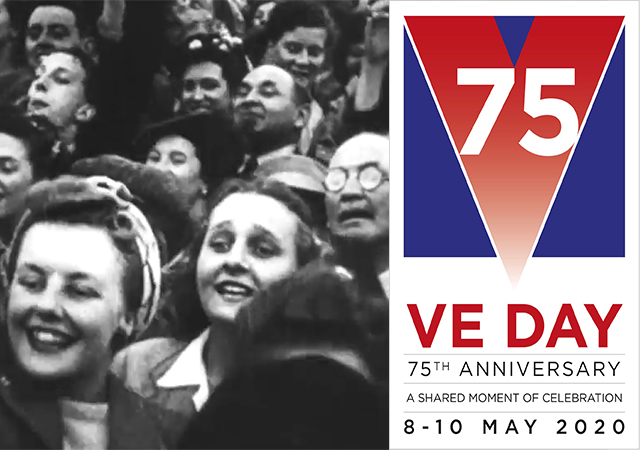 People celebrating VE Day in 1945 and today's VE Day logo. [photos: Imperial War Museum and VE75.org]
People celebrating VE Day in 1945 and today's VE Day logo. [photos: Imperial War Museum and VE75.org]
My personal Covid-19 bulletin is being written in London, 75 years after the end of the Second World War in Europe. On that evening, as a small boy, I remember seeing celebratory fireworks and a searchlight tattoo from a “clifftop” in the Surrey pinewoods. I had recently returned home after evacuation in Lincolnshire.
Today is a bank holiday, but one cannot go out. One of the challenges of lockdown in the virus is that one day at home is much like another. I keep sane by keeping to little routines; by walking our dog for 25 minutes to a Greenwich allotment where I grow vegetables; by writing a pandemic diary – its title is, “What did you do in the pandemic, Grandpa?”, and it is loosely inspired by Defoe’s “A Journal of the Plague Year”; by looking forward to a weekly quiz on Zoom with our children in Manchester, near Marlow and south of Guildford ( where my wife Juliet and I have the grace to come last ); by appreciating the kindness of our neighbours.
We are in our 70s, and self-isolating. An irritating aspect of the Covid messaging in the UK is the emphasis on age, something I prefer to ignore. At one point it looked as though all those over 70 might be locked in their homes for three months. Ridiculous, when the Head of the Commonwealth is fit and over 94, and being called on as Head of State to make three addresses to the nation in just a few weeks.
But the kindness and compassion of people in the UK – not just in our street where people give us bakeries and collect items from the shops – is something wonderful. Whatever the bungles at a political level – and we have just roared into the lead for deaths in Europe while, in the Commonwealth, 5 million well-governed people in New Zealand are able to emerge into normality – there are many heroes. In addition to the health service and care workers there are the volunteers, the supermarket and transport staff, and civil servants who have operated financial support schemes for laid-off workers surprisingly quickly.
Shortly after VE Day there were huge changes, and there will be after Covid-19. It has been a blow to the solar plexus of the world economy, and a running critique of the performance of certain governments. The “cause of freedom”, pronounced by Churchill in his victory speech on 8 May 1945, led to decolonisation. But freedom was delayed in eastern Europe, where the Red Army installed satellite dictatorships. The UK, a world power in 1939, became a junior partner in the Anglo-American alliance. Nuclear destruction in Hiroshima and Nagasaki ended the Pacific war, but launched a nuclear nightmare.
Within the UK, only a few weeks after the European war, voters gave the Labour Party a landslide. It was a backlash vote against the harshness and inequality of the depression years, and for the hopes of a weary population who had pulled together to defeat Nazism and Japan’s “Greater East Asia Co-Prosperity Sphere.” It led positively to a National Health Service, a welfare state, and secondary schooling for all.
Post-war was not good or easy, but it is worth remembering now that it was a global alliance that defeated Nazi Germany and Imperial Japan. Covid is hitting livelihoods in many poor communities where extra deaths from a new kind of flu may have less impact than hunger and malnutrition from its fallout. When I pause for two minutes of silence in London on VE Day I will hope that the world can cooperate not just to find a vaccine, but to stimulate a greener, less polluting and sustainable economy after the pandemic.
Richard Bourne is a member of the Round Table Editorial Board.



